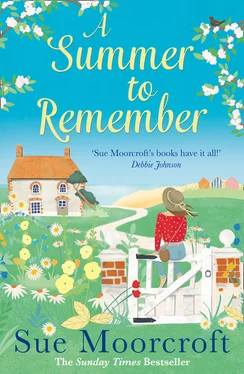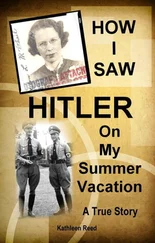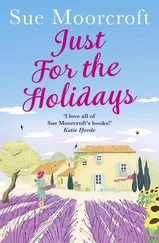‘There’s a good, capacious freezer,’ pronounced Dilys. ‘Capacious was the answer to the nine-letter word puzzle in the paper yesterday.’
Clancy tried not to be distracted by the energetic pinging of the phone in her pocket now they’d left the village and, presumably, picked up a signal. ‘Are you a puzzler? I like Sudoku and crosswords.’ They passed the rest of the journey amicably chatting about why cryptic crosswords were so much more fun than the ‘easy’ counterparts, which neither of them actually found easy, until they reached Hunstanton, where, entranced by the dancing blue sea on their right, Clancy had to concentrate to follow Dilys’s directions past the formal gardens and through the busy traffic to the centre of town.
When she’d parked at Tesco’s, she stole a quick look at the alerts now showing on the screen of her phone: Tracey and Asila both asking if she was OK. After a moment’s deliberation, she tucked the phone away again because she didn’t know how to reply. Was she OK? She could’ve said, Fine except for my relationship ending and my co-directors wanting me out of the business , but as they were two of those directors it would be a) aggressive b) whiney c) pointless. It would be more fruitful to devote her time to providing herself with what she needed in order to be OK.
As well as filling a trolley with food and household items, she discovered that seaside supermarkets sold things like wetsuits for children, buckets and spades … and airbeds. Just in case Aaron truly intended leaving her without a bed for the night, she bought a lilac-coloured one for less than a tenner and Dilys offered to lend her a duvet. She hadn’t wanted to bring constant reminders of Will in the form of things they’d shared so new bedclothes would be on her shopping list once she had a permanent bed sorted.
It was late afternoon when they arrived back at the Roundhouse. Clancy helped Dilys into number two with her shopping and collected in return a single duvet in a bold, bright patchwork cover, then carried her own purchases indoors to join the bags and boxes she’d brought from London.
She halted. London was no longer her home.
The echoing emptiness of the Roundhouse seemed to catch her suddenly beneath the breastbone, the only sounds her own breathing and muted birdsong outdoors. ‘You can do this,’ she told herself aloud. ‘This is not the first time you’ve moved house and begun again.’ So she set to, dividing the shopping between fridge, freezer and cupboards. Kitchen units had been fitted along a section of the curved wall and into an island unit too. As she worked, she wished she’d asked Aaron exactly when he’d be back. Dilys probably had his landline number but there was no reply when Clancy popped out to knock on her door.
OK. Back to the Roundhouse. She walked a slow circle around the ground floor, remembering how Alice and Lee had set the space out in segments: sofas, a coffee table and footstools beside the panelling screen; then a circular dining table with chairs, and the space beneath the stairs filled with oak and glass cabinets built by Lee.
Next, she trod up the wooden staircase to the three wedge-shaped bedrooms and two bathrooms on the first floor. All three bedrooms were carpeted so it felt less echoey. In the master bedroom she stood on tiptoe to catch glimpses of a hazy blue-grey sea between trees and houses. Woolly white clouds dotted a paintbox-blue sky. Nelson’s Bar was high above the waves on its headland but she remembered Alice showing her the way down to a small beach.
She turned to survey the master bedroom without much enthusiasm. It had been Alice and Lee’s. Across the landing, the second bedroom’s view was of the lane and the house across the road. She turned and strode up the next flight of stairs to the loft, where she’d slept on her only visit, opening the door with a teeny-tiny – but welcome – sense of familiarity.
The space she walked into was conical with room to stand straight only in the middle or by the window dormers. Beyond the rooftops, she could see the sea from one window and the pinewoods from the other. She stood for a long time, gazing over the village. Gardens and trees between the houses. The peaceful sound of seagulls and the occasional car engine.
The sun lit the room, danced on the distant sea and warmed her heart.
Feeling something approaching enthusiasm, she ran downstairs for the airbed and duvet. By the time the bed was inflated she was red-faced and puffing, but she smiled as she cast the patchwork quilt over it.
Her temporary bed in her new room and new home. So there was no real furniture! Nobody who really knew her would think she’d be put off by a little thing like that.
Chapter Three Contents Cover Title Page A SUMMER TO REMEMBER Sue Moorcroft Copyright Dedication Prologue Chapter One Chapter Two Chapter Three Chapter Four Chapter Five Chapter Six Chapter Seven Chapter Eight Chapter Nine Chapter Ten Chapter Eleven Chapter Twelve Chapter Thirteen Chapter Fourteen Chapter Fifteen Chapter Sixteen Chapter Seventeen Chapter Eighteen Chapter Nineteen Chapter Twenty Chapter Twenty-One Chapter Twenty-Two Chapter Twenty-Three Chapter Twenty-Four Chapter Twenty-Five Chapter Twenty-Six Chapter Twenty-Seven Chapter Twenty-Eight Epilogue Acknowledgements Keep Reading … About the Author About the Publisher
In the morning, Aaron’s conscience prodded him awake ridiculously early, considering it was Sunday.
He hadn’t meant to leave Clancy Moss alone in an unfurnished house yesterday.
He’d met Genevieve at his end-terrace flint cottage in Potato Hall Row on the edge of the village near the cliffs, and found her worrying aloud about where to go while builders repaired her own cottage. It was a tricky subject. He was all too aware that she was fishing to move in with him and he was beginning to resent it. They might have been together for a year or so but he liked his life in Nelson’s Bar as it was. He was content with his own company, creating gardens, soil between his fingers, the scent of grass on the air, blossom in spring, crinkling leaves and the promise of frost when autumn came. Nature’s glorious, ever-changing landscape. OK, he didn’t have much of a relationship history – serial monogamy interspersed with happy singledom – maybe his brother’s public dumping had had something to do with that.
But that was his choice.
As it happened, while he’d been trying hard not to tackle the issue of where Genevieve was going to spend the months the builder needed to underpin her house, Aaron’s mum Yvonne had telephoned. ‘Aunt Norma’s broken her ankle on a day trip to King’s Lynn, and bumped her head. She’s got to stay in hospital overnight. Your dad’s on shift at the hotel—’
Knowing his mother’s car control in times of stress, Aaron immediately offered, ‘I’ll drive you.’ His great-aunt had looked after him and Lee a lot when they were little so Yvonne could work. He’d apologised to Genevieve and was soon driving his mother out of the village, noticing the absence of Clancy’s car outside the Roundhouse and sparing a moment to wonder whether she’d decided to head home to London already.
He had little opportunity to examine his reaction to that possibility during the hassly fifty-minute journey as Yvonne alternately worried aloud about her aunt and reproved him for the disreputable interior of his double-cab pickup, littered with notes, plans of gardens and empty crisp packets.
Once at the Queen Elizabeth Hospital, they found Aunt Norma had concussion. Queasy and quiet, she looked unlike her usual noisy, feisty self. Yvonne croaked, ‘Oh, Auntie! You poor thing!’ and became quite tearful.
They stayed on, requesting information of nurses and buying Aunt Norma magazines from the hospital shop. Her normally bright eyes were closed against queasiness and she didn’t tease anyone or ask awkward questions, so they knew she had to be feeling pretty rubbish.
Читать дальше












